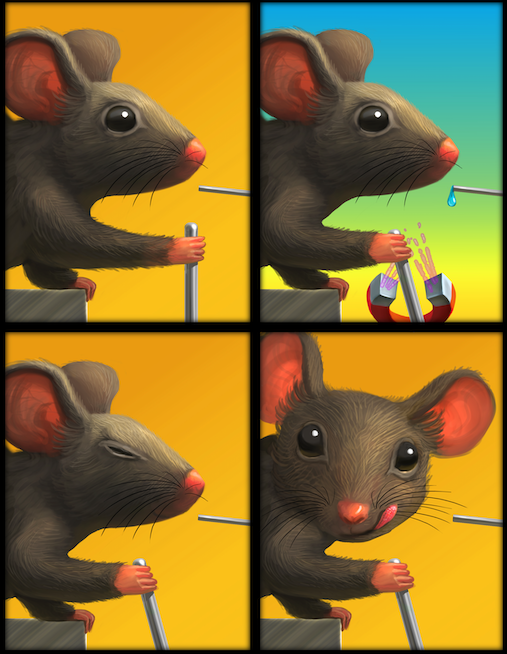Our Research
Our works fall into three groupings: Neuroscience, machine learning, and computer vision. Our collective works can be found on Google Scholar or here; below we arrange our key publications according to our focus area. These areas deeply intersect and form the basis for our mission.
Neuroscience & Neuroengineering
How do animals learn to adapt? How does the brain construct and adapt internal models of the world, which enable us to compensate for sensory delays and make better predictions? We develop skilled motor tasks where mice can learn from dynamically changing sensory and reward landscapes. We also study adaptive natural behaviors. In particular, we are interested in continual learning in both biological and artificial agents. The work in this area is focused on using mice as a model system for motor learning and adaptation (combining behavioral assays with large-scale neural recordings using electrophysiology and 2-photon mesoscopy). Collectively, we take an approach called reverse engineering where we perform theory-guided experiments and refine our knowledge of the system.
Selected Publications:
Neuro-musculoskeletal modeling reveals muscle-level neural dynamics of adaptive learning in sensorimotor cortex. Travis DeWolf*, Steffen Schneider*, Paul Soubiran, Adrian Roggenbach, Mackenzie Weygandt Mathis. BioRxiv 2024
Contrasting action and posture coding with hierarchical deep neural network models of proprioception. Kai Sandbrink, Pranav Mamidanna, Claudio Michaelis, Mathias Bethge, Mackenzie W. Mathis^, Alexander Mathis.^ (^co-senior). eLife 2023
The neocortical column as a universal template for perception and world-model learning. Mackenzie W. Mathis. Nature Reviews Neuroscience 2023
Somatosensory Cortex Plays an Essential Role in Forelimb Motor Adaptation in Mice, Mackenzie W. Mathis, Alexander Mathis, Naoshige Uchida. Neuron 2017
Watch a talk related to these topics here:
Machine Learning (+NeuroAI)
We develop both tools and new approaches to studying neural circuits and behavior in our quest to understand internal models of the world. We are currently working on new methods to jointly model behavior & neural data with explainable AI (see CEBRA) to develop interpretable and generalizable models. We also developed deep neural networks for the study of proprioception, and sensorimotor control. Our review on how machine learning is enhancing the study of the motor system is a good roadmap for our approach.
Selected Publications:
Learnable latent embeddings for joint behavioral and neural analysis. Steffen Schneider*, Jin Lee*, Mackenzie W. Mathis. Nature 2023
Adversarially Robust Out-of-Distribution Detection Using Lyapunov-Stabilized Embeddings. Hossein Mirzaei & Mackenzie Weygandt Mathis. ICLR 2025
Measuring and modeling the motor system with machine learning. Sebastien B. Hausmann, Alessandro Marin Vargas, Alexander Mathis, Mackenzie W. Mathis. Current Opinion in Neurobiology 2021
Out-of-distribution generalization of internal models is correlated with reward. Khushdeep S. Mann∗, Steffen Schneider∗, Alberto Chiappa, Jin H. Lee, Matthias Bethge, Alexander Mathis, Mackenzie W. Mathis. SSL-RL Workshop at ICLR 2021
Watch a talk related to these topics here:
Computer Vision
Behavior is an essential component for understanding neural function. As part of our quest to better understand the brain, we develop new technology that helps us better measure behavior and neural data. We have worked to pioneer new methods to measure behavior robustly and efficiently. Our ongoing and related work on developing DeepLabCut™, DLC2Kinematics, CEBRA, and our work on transfer learning and robustness.
Selected Publications:
DeepLabCut: markerless pose estimation of user-defined body parts with deep learning. Alexander Mathis, Pranav Mamidanna, Kevin M. Cury, Taiga Abe, Venkatesh N. Murthy, Mackenzie W Mathis* & Matthias Bethge* *co-senior authors. Nature Neuroscience 2018
Multi-animal pose estimation, identification and tracking with DeepLabCut. Jessy Lauer, Mu Zhou, Shaokai Ye, William Menegas, Steffen Schneider, Tanmay Nath, Mohammed Mostafizur Rahman, Valentina Di Santo, Daniel Soberanes, Guoping Feng, Venkatesh N. Murthy, George Lauder, Catherine Dulac, Mackenzie Weygandt Mathis* & Alexander Mathis* Nature Methods 2022
Deep learning tools for the measurement of animal behavior in neuroscience. Mackenzie W. Mathis & Alexander Mathis. Current Opinion in Neurobiology 2020
Real-time, low-latency closed-loop feedback using markerless posture tracking. Gary Kane, Gonçalo Lopes, Jonny L. Saunders, Alexander Mathis, Mackenzie W. Mathis. eLife 2020
Pretraining boosts out-of-domain robustness for pose estimation. Alexander Mathis*, Thomas Biasi*, Steffen Schneider, Mert Yüksekgönül, Byron Rogers, Matthias Bethge, Mackenzie W. Mathis. WACV 2021
Watch a talk related to these topics here:
To see our publications in chronological order, see here.
















